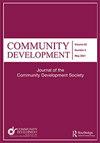WoW Bus农村幼儿外展合作中受约束的学区领导者
IF 1.4
Q3 DEVELOPMENT STUDIES
引用次数: 0
摘要
由于人口密度低,有时旅行时间长或复杂,以及季节性活动的波动,农村社区在提供早期儿童教育和护理方面面临挑战。学校等稳定的合作伙伴有机会为幼儿提供支持。协作规划理论被用于探索省级能力建设倡议(成功6),该倡议为一个为期两年的农村幼儿外展项目(WoW Bus项目)提供了地方资金。分析表明,虽然社区合作伙伴很热情,家庭也一直参与其中,但合作和等级责任之间也存在紧张关系,最终破坏了项目的可持续性。协作规划理论的镜头,在这里应用于一个社会规划倡议,帮助阐明了合法化的责任,以扩大和多样化的参与的必要性。总而言之,虽然学校提供了一个未被充分开发的机会来巩固农村在幼儿支持方面的创新,但需要改变资助者的责任。本文章由计算机程序翻译,如有差异,请以英文原文为准。
School districts as constrained leaders in the WoW Bus rural early childhood outreach collaborative
ABSTRACT Rural communities are challenged to provide early childhood education and care due to low population density, sometimes lengthy or complex travel, and fluctuations in seasonal activity. Opportunities exist for stable partners, like schools, to anchor early childhood supports. Collaborative planning theory is used to explore a provincial capacity-building initiative (Success by 6) that provided local funding for a two-year rural early childhood outreach project, the WoW Bus project. The analysis shows that while community partners were enthusiastic and there was consistent family engagement, there were also tensions between collaboration and hierarchical responsibilities that ultimately undermined project sustainability. The collaborative planning theory lens, applied here to a social planning initiative, helped elucidate the need for legitimating accountability for outreach and diverse engagement. In sum, while schools provide an under-explored opportunity to anchor rural innovation in early childhood supports, a shift in funder accountabilities is needed.
求助全文
通过发布文献求助,成功后即可免费获取论文全文。
去求助
来源期刊

Community Development
DEVELOPMENT STUDIES-
CiteScore
2.60
自引率
30.80%
发文量
62
期刊介绍:
Community Development is the peer-reviewed journal of the Community Development Society. Community Development is devoted to improving knowledge and practice in the field of purposive community change. The mission of the journal is to advance critical theory, research, and practice in all domains of community development, including sociocultural, political, environmental, and economic. The journal welcomes manuscripts that report research; evaluate theory, methods, and techniques; examine community problems; or critically analyze the profession itself. Articles may address current issues including the environment and sustainability; food systems; land use; poverty; race, ethnicity, and gender; participation and social justice; economic development; health; housing; and other important topics impacting the field.
 求助内容:
求助内容: 应助结果提醒方式:
应助结果提醒方式:


